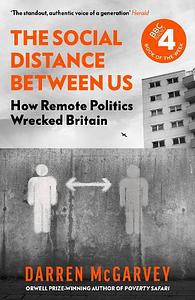Take a photo of a barcode or cover
A fantastic book, I'm always interested to hear what McCarvey has to say.
informative
medium-paced
As I steadily plod on in years, the number of experiences I've had that reflects Darrens commentary or insight similarly grows. I've seen first hand the effects that Darren discusses in his book, not least due to living in similar communities but also in working in the homelessness sector in Scotlands biggest city. He absolutely hits the nail on the head with this commentary and explains valuable and thought provoking concepts in an incredibly real and expressive manner. I found myself saying 'Exactly!' out loud several times in agreement with his, and other folks, observations.
If you haven't read 'Poverty Safari', put that on your list next, and hopefully see you in the trenches fighting for better things.
If you haven't read 'Poverty Safari', put that on your list next, and hopefully see you in the trenches fighting for better things.
challenging
informative
reflective
slow-paced
Really good, up-to-the-minute account of the state of Britain in the post-thatcher, post-Blair, post-crash, post-Brexit, post-covid era. To summarise: fairly fucked.
He explores it in more detail though, taking about class as the core driving force of social change, and more likely than identity politics to lead to a satisfactory outcome. There's good analysis of the roots of Brexit, the use and misuse of populism, and a lot more besides. He takes a few liberties along the way - not really acknowledging economic forces (like technological change) that are driving a lot of these changes, or not acknowledging agency on the part of some of the people who are painted as helpless victims of society when their problems are entirely self-generated. But it would be wrong to point to this special pleading as a reason to disregard the main message - which is that we need to get a bit more creative with our policies and try to get back to a cohesive society that works for everyone.
Also delighted that he avoids slipping into an american/social-media style of discourse. I got a bit worried when he said he was "exhausted" from doing "emotional labour" at one point, but it was just a blip and he went back to talking like a human again straight after.
He does his best to keep the reader facing the unpleasant facts, even going to the lengths of reminding us middle-class bas.... er... readers that it's not enough to out the book down and forget it when we're finished. The point is slightly undercut immediately afterwards in the acknowledgements when he thanks his nanny. OK, well, I thought I was middle class till you said that.
What's weird about it is how conservative it is. By that I mean he's trying to patch up a lot of good things that have been lost. He's rejecting modernity in the form of free-market economics and embracing tradition in the form of society at large having a place for everyone and not just throwing them on the scrapheap because they're not economically viable. Now of course it's not any kind of conservatism that a conservative would recognise, but that's a feature of how far we've come over the last few decades. About 20% of the material, if it was buffed up a bit to have a more pompous tone, wouldn't sound out of place in a Peter Hitchens column.
He explores it in more detail though, taking about class as the core driving force of social change, and more likely than identity politics to lead to a satisfactory outcome. There's good analysis of the roots of Brexit, the use and misuse of populism, and a lot more besides. He takes a few liberties along the way - not really acknowledging economic forces (like technological change) that are driving a lot of these changes, or not acknowledging agency on the part of some of the people who are painted as helpless victims of society when their problems are entirely self-generated. But it would be wrong to point to this special pleading as a reason to disregard the main message - which is that we need to get a bit more creative with our policies and try to get back to a cohesive society that works for everyone.
Also delighted that he avoids slipping into an american/social-media style of discourse. I got a bit worried when he said he was "exhausted" from doing "emotional labour" at one point, but it was just a blip and he went back to talking like a human again straight after.
He does his best to keep the reader facing the unpleasant facts, even going to the lengths of reminding us middle-class bas.... er... readers that it's not enough to out the book down and forget it when we're finished. The point is slightly undercut immediately afterwards in the acknowledgements when he thanks his nanny. OK, well, I thought I was middle class till you said that.
What's weird about it is how conservative it is. By that I mean he's trying to patch up a lot of good things that have been lost. He's rejecting modernity in the form of free-market economics and embracing tradition in the form of society at large having a place for everyone and not just throwing them on the scrapheap because they're not economically viable. Now of course it's not any kind of conservatism that a conservative would recognise, but that's a feature of how far we've come over the last few decades. About 20% of the material, if it was buffed up a bit to have a more pompous tone, wouldn't sound out of place in a Peter Hitchens column.
emotional
informative
reflective
sad
slow-paced
This is a MUST read!! A real eye opener and a perfect book to base important discussions on. Yes, the book contains views belonging to certain political camps, but the painstakingly detailed research that has gone into creating this book including a huge number of real life examples make Darren McGarvey and his book forces to be reckoned with. Politicians, policy makers and those who want to, or more importantly can, influence decision making in Britain, should make it a priority to read this book.
The book extensively discusses how proximity is one of the biggest reasons for failure in most of the political system used in Britain today. The lack of actual lived experience of policy makers in Whitehall and the devolved nations, make policies fail miserably; in many cases not by ill-intent, but because the policy makers just cannot fathom what the actual problem is and how it can be addressed.
Possibly an uncomfortable read for the mandarins in British politics, but that's exactly the reason this book should be taken seriously.
The book extensively discusses how proximity is one of the biggest reasons for failure in most of the political system used in Britain today. The lack of actual lived experience of policy makers in Whitehall and the devolved nations, make policies fail miserably; in many cases not by ill-intent, but because the policy makers just cannot fathom what the actual problem is and how it can be addressed.
Possibly an uncomfortable read for the mandarins in British politics, but that's exactly the reason this book should be taken seriously.
This book is angry, and rightly so.
Charting a route through many inequalities in society, McGarvey's argument is deceptively simple- that the social distance we think of now from Covid is only a more modern version of what has been happening societally for centuries, namely that the lives of the poorest and most vulnerable in society are almost never seen by those on the other end of fortune.
The book covers topics such as unequal health outcomes, addiction, aspiration, class and much more, using this lens to show how inured many people's lives are from seeing the reality around them.
This distance multiplies over time, as those who pass laws and oversee programmes to support the most vulnerable often live the kinds of lives that rarely interact with those who they are aiming to support.
This book is raging fire of the best kind, designed to burn down and start again.
I received an advanced copy of this book from NetGalley in exchange for an honest review.
Charting a route through many inequalities in society, McGarvey's argument is deceptively simple- that the social distance we think of now from Covid is only a more modern version of what has been happening societally for centuries, namely that the lives of the poorest and most vulnerable in society are almost never seen by those on the other end of fortune.
The book covers topics such as unequal health outcomes, addiction, aspiration, class and much more, using this lens to show how inured many people's lives are from seeing the reality around them.
This distance multiplies over time, as those who pass laws and oversee programmes to support the most vulnerable often live the kinds of lives that rarely interact with those who they are aiming to support.
This book is raging fire of the best kind, designed to burn down and start again.
I received an advanced copy of this book from NetGalley in exchange for an honest review.
informative
reflective
medium-paced
challenging
informative
inspiring
slow-paced




